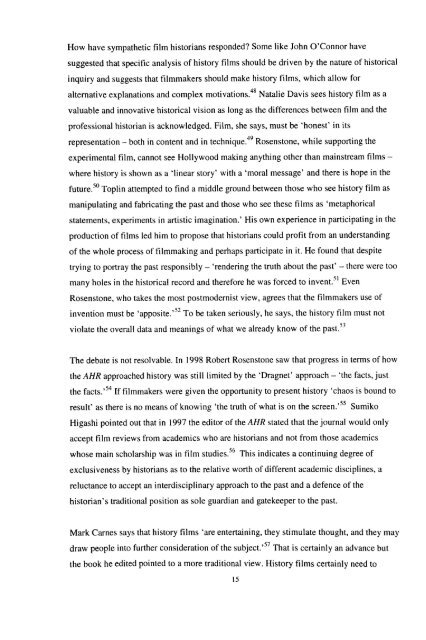Download (3483kB) - Greenwich Academic Literature Archive ...
Download (3483kB) - Greenwich Academic Literature Archive ...
Download (3483kB) - Greenwich Academic Literature Archive ...
- No tags were found...
Create successful ePaper yourself
Turn your PDF publications into a flip-book with our unique Google optimized e-Paper software.
How have sympathetic film historians responded? Some like John O'Connor havesuggested that specific analysis of history films should be driven by the nature of historicalinquiry and suggests that filmmakers should make history films, which allow foralternative explanations and complex motivations.48 Natalie Davis sees history film as avaluable and innovative historical vision as long as the differences between film and theprofessional historian is acknowledged. Film, she says, must be 'honest' in itsrepresentation - both in content and in technique.49 Rosenstone, while supporting theexperimental film, cannot see Hollywood making anything other than mainstream films -where history is shown as a 'linear story' with a 'moral message' and there is hope in thefuture. 50 Toplin attempted to find a middle ground between those who see history film asmanipulating and fabricating the past and those who see these films as 'metaphoricalstatements, experiments in artistic imagination.' His own experience in participating in theproduction of films led him to propose that historians could profit from an understandingof the whole process of filmmaking and perhaps participate in it. He found that despitetrying to portray the past responsibly - 'rendering the truth about the past' - there were toomany holes in the historical record and therefore he was forced to invent. 51 EvenRosenstone, who takes the most postmodernist view, agrees that the filmmakers use ofinvention must be 'apposite.' 52 To be taken seriously, he says, the history film must notviolate the overall data and meanings of what we already know of the past. 53The debate is not resolvable. In 1998 Robert Rosenstone saw that progress in terms of howthe AHR approached history was still limited by the 'Dragnet' approach - 'the facts, justthe facts.' 54 If filmmakers were given the opportunity to present history 'chaos is bound toresult' as there is no means of knowing 'the truth of what is on the screen.' 55 SumikoHigashi pointed out that in 1997 the editor of the AHR stated that the journal would onlyaccept film reviews from academics who are historians and not from those academicswhose main scholarship was in film studies. 56 This indicates a continuing degree ofexclusiveness by historians as to the relative worth of different academic disciplines, areluctance to accept an interdisciplinary approach to the past and a defence of thehistorian's traditional position as sole guardian and gatekeeper to the past.Mark Carnes says that history films 'are entertaining, they stimulate thought, and they maydraw people into further consideration of the subject.' 57 That is certainly an advance butthe book he edited pointed to a more traditional view. History films certainly need to15
















